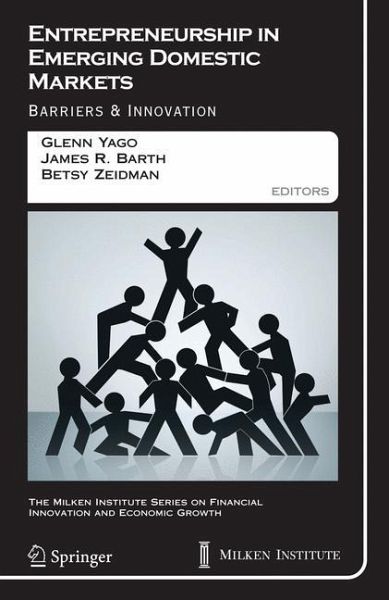
Entrepreneurship in Emerging Domestic Markets
Barriers and Innovation
Herausgegeben: Yago, Glenn; Barth, James R.; Zeidman, Betsy
Versandkostenfrei!
Versandfertig in 6-10 Tagen
68,99 €
inkl. MwSt.

PAYBACK Punkte
34 °P sammeln!
- This book will be the most up-to-date compilation of different perspectives on entrepreneurship.
- The authors are highly respected in the field, either as scholars or practitioners and have interacted before on this topic either as co-authors on papers or as conference discussants
- The research provides historical information as well as the latest data on entrepreneurship
- The book focuses on "emerging domestic markets" which encompasses minorities, women, and low-income communities
- The authors are highly respected in the field, either as scholars or practitioners and have interacted before on this topic either as co-authors on papers or as conference discussants
- The research provides historical information as well as the latest data on entrepreneurship
- The book focuses on "emerging domestic markets" which encompasses minorities, women, and low-income communities
An often-overlooked aspect of entrepreneurship in American is its role in emerging domestic markets (EDM). These markets - low-to-moderate income communities, ethnic- and women-owned businesses, urban areas - are frequently ignored by mainstream markets. Yet with current demographic trends, they are an increasingly large component of the US population. Entrepreneurship can serve as a means to foster business development in these emerging communities and as a critically important way to improve the standard of living in low- and moderate-income (LMI) sectors.
Increasingly, policy makers, advocates and investors understand national economic growth demands business formation among all segments of the market, and that the best attack on poverty is job and wealth creation. A robust entrepreneurial climate helps address the challenges and harness the opportunities.
"Entrepreneurship in Emerging Domestic Markets: Barriers and Innovation" is a compendium of papers written by the leading researchers and practitioners from the fields of finance, public policy, entrepreneurship, and economics. With this volume, the editors aim to provide scholars, students, investors, policymakers, and the business community a resource that explores the issues surrounding entrepreneurship in EDM communities.
Increasingly, policy makers, advocates and investors understand national economic growth demands business formation among all segments of the market, and that the best attack on poverty is job and wealth creation. A robust entrepreneurial climate helps address the challenges and harness the opportunities.
"Entrepreneurship in Emerging Domestic Markets: Barriers and Innovation" is a compendium of papers written by the leading researchers and practitioners from the fields of finance, public policy, entrepreneurship, and economics. With this volume, the editors aim to provide scholars, students, investors, policymakers, and the business community a resource that explores the issues surrounding entrepreneurship in EDM communities.














